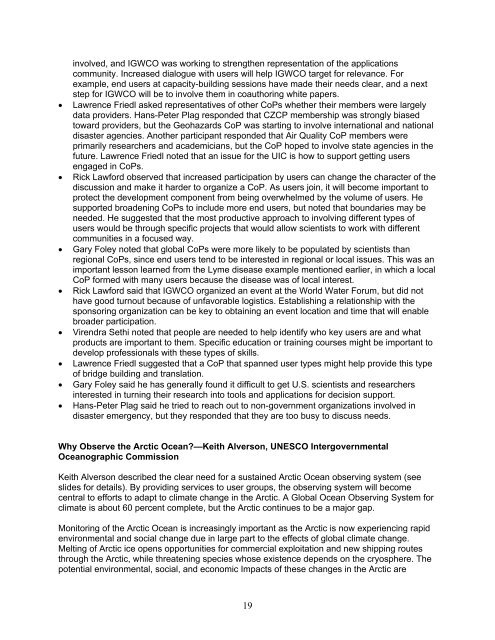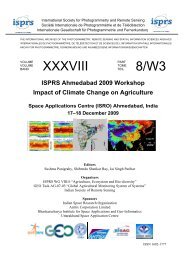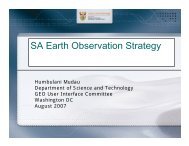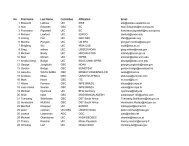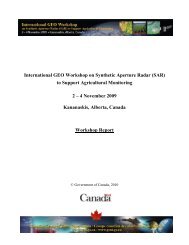GEO UIC Committee: - Group on Earth Observations
GEO UIC Committee: - Group on Earth Observations
GEO UIC Committee: - Group on Earth Observations
You also want an ePaper? Increase the reach of your titles
YUMPU automatically turns print PDFs into web optimized ePapers that Google loves.
involved, and IGWCO was working to strengthen representati<strong>on</strong> of the applicati<strong>on</strong>s<br />
community. Increased dialogue with users will help IGWCO target for relevance. For<br />
example, end users at capacity-building sessi<strong>on</strong>s have made their needs clear, and a next<br />
step for IGWCO will be to involve them in coauthoring white papers.<br />
• Lawrence Friedl asked representatives of other CoPs whether their members were largely<br />
data providers. Hans-Peter Plag resp<strong>on</strong>ded that CZCP membership was str<strong>on</strong>gly biased<br />
toward providers, but the Geohazards CoP was starting to involve internati<strong>on</strong>al and nati<strong>on</strong>al<br />
disaster agencies. Another participant resp<strong>on</strong>ded that Air Quality CoP members were<br />
primarily researchers and academicians, but the CoP hoped to involve state agencies in the<br />
future. Lawrence Friedl noted that an issue for the <str<strong>on</strong>g>UIC</str<strong>on</strong>g> is how to support getting users<br />
engaged in CoPs.<br />
• Rick Lawford observed that increased participati<strong>on</strong> by users can change the character of the<br />
discussi<strong>on</strong> and make it harder to organize a CoP. As users join, it will become important to<br />
protect the development comp<strong>on</strong>ent from being overwhelmed by the volume of users. He<br />
supported broadening CoPs to include more end users, but noted that boundaries may be<br />
needed. He suggested that the most productive approach to involving different types of<br />
users would be through specific projects that would allow scientists to work with different<br />
communities in a focused way.<br />
• Gary Foley noted that global CoPs were more likely to be populated by scientists than<br />
regi<strong>on</strong>al CoPs, since end users tend to be interested in regi<strong>on</strong>al or local issues. This was an<br />
important less<strong>on</strong> learned from the Lyme disease example menti<strong>on</strong>ed earlier, in which a local<br />
CoP formed with many users because the disease was of local interest.<br />
• Rick Lawford said that IGWCO organized an event at the World Water Forum, but did not<br />
have good turnout because of unfavorable logistics. Establishing a relati<strong>on</strong>ship with the<br />
sp<strong>on</strong>soring organizati<strong>on</strong> can be key to obtaining an event locati<strong>on</strong> and time that will enable<br />
broader participati<strong>on</strong>.<br />
• Virendra Sethi noted that people are needed to help identify who key users are and what<br />
products are important to them. Specific educati<strong>on</strong> or training courses might be important to<br />
develop professi<strong>on</strong>als with these types of skills.<br />
• Lawrence Friedl suggested that a CoP that spanned user types might help provide this type<br />
of bridge building and translati<strong>on</strong>.<br />
• Gary Foley said he has generally found it difficult to get U.S. scientists and researchers<br />
interested in turning their research into tools and applicati<strong>on</strong>s for decisi<strong>on</strong> support.<br />
• Hans-Peter Plag said he tried to reach out to n<strong>on</strong>-government organizati<strong>on</strong>s involved in<br />
disaster emergency, but they resp<strong>on</strong>ded that they are too busy to discuss needs.<br />
Why Observe the Arctic Ocean?—Keith Alvers<strong>on</strong>, UNESCO Intergovernmental<br />
Oceanographic Commissi<strong>on</strong><br />
Keith Alvers<strong>on</strong> described the clear need for a sustained Arctic Ocean observing system (see<br />
slides for details). By providing services to user groups, the observing system will become<br />
central to efforts to adapt to climate change in the Arctic. A Global Ocean Observing System for<br />
climate is about 60 percent complete, but the Arctic c<strong>on</strong>tinues to be a major gap.<br />
M<strong>on</strong>itoring of the Arctic Ocean is increasingly important as the Arctic is now experiencing rapid<br />
envir<strong>on</strong>mental and social change due in large part to the effects of global climate change.<br />
Melting of Arctic ice opens opportunities for commercial exploitati<strong>on</strong> and new shipping routes<br />
through the Arctic, while threatening species whose existence depends <strong>on</strong> the cryosphere. The<br />
potential envir<strong>on</strong>mental, social, and ec<strong>on</strong>omic Impacts of these changes in the Arctic are<br />
19


